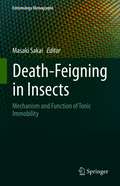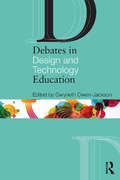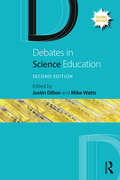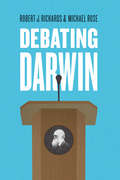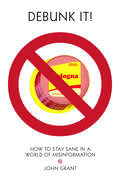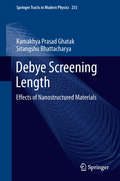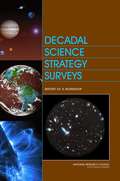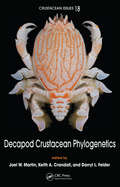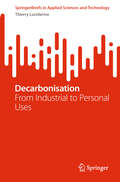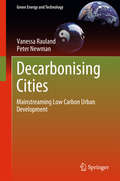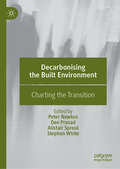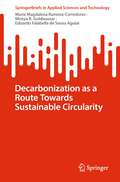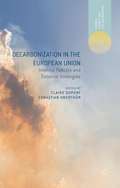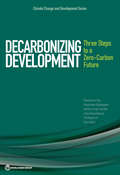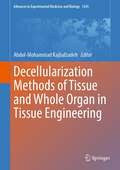- Table View
- List View
Death-Feigning in Insects: Mechanism and Function of Tonic Immobility (Entomology Monographs)
by Masaki SakaiThis book examines the mechanisms and functions of tonic immobility, the so-called death feigning behavior, or thanatosis, or animal hypnosis. The chapters cover the neurophysiological and experimental studies on insects, the functional significance of death-feigning, examination of the freezing and immobility behavior in insects through environment, physiology, genetics, and responses to ultrasound and vibration. It also covers tonic immobility and freezing behavior in fish from the perspective of vertebrates study.Tonic immobility is an interesting behavior that occurs reflexively in various animals under physical restraint by predators. The physiological mechanism of thanatosis was extensively investigated during 1960-1980. Researchers have proposed hypotheses to explain the mechanism underlying tonic immobility in vertebrates; local inhibition of the central nervous system, acceleration of the limbic system, abnormal control of the autonomic nervous system. On the other hand, the peripheral and central mechanisms of tonic immobility were intensely investigated at a behavioral and a neuronal level in stick insects and crickets. In the 1970s, behavioral ecology has shed light on the aspect of an ultimate factor for tonic immobility. Ethologists and ecologists challenged this matter in the laboratory and natural habitats, and have collected evidence for its functional roles using mainly insects such as beetles, moths, locusts. More recently, studies of tonic immobility in humans are drawing attention, as clinicians are trying to explain the defencelessness of rape victims from the viewpoint of animal hypnosis.This timely publication provides an understanding of the past and present research of the mechanisms and functions of tonic immobility. This book is intended for researchers and undergraduate/ graduate students in the field of zoology including physiology, ethology, ecology, and human behavior. It will also appeal to the public audience who has an interest in animal behavior, including human behavior.
Death: Perspectives from the Philosophy of Biology
by Philippe HunemanThis book addresses several key issues in the biological study of death with the intent of capturing their genealogy, the assumptions and presuppositions they make, and the way that they open specific new research avenues. The book is divided into two sections: the first considers physiology and the second evolutionary biology. In the first part, Huneman reconstructs a conceptual genealogy of experimental physiology based on an in-depth analysis of Bichat's investigations of death processes. In the second part he explains that biologists in the late 1950s put forth a research framework that evolutionarily accounts for death in terms of either an effect of the weakness of natural selection or a by-product of natural selection for early reproduction. He illustrates how the biology of death is a central field and that studying it provides insight into the way that the epistemic structure of this knowledge has been constituted, persists until now, and may conflict with some traditional philosophical ideas.
Debate Dynamics: How Controversy Improves Our Beliefs
by Gregor BetzIs critical argumentation an effective way to overcome disagreement? And does the exchange of arguments bring opponents in a controversy closer to the truth? This study provides a new perspective on these pivotal questions. By means of multi-agent simulations, it investigates the truth and consensus-conduciveness of controversial debates. The book brings together research in formal epistemology and argumentation theory. Aside from its consequences for discursive practice, the work may have important implications for philosophy of science and the way we construe scientific rationality as well.
Debate Dynamics: How Controversy Improves Our Beliefs (Synthese Library #357)
by Gregor BetzIs critical argumentation an effective way to overcome disagreement? And does the exchange of arguments bring opponents in a controversy closer to the truth? This study provides a new perspective on these pivotal questions. By means of multi-agent simulations, it investigates the truth and consensus-conduciveness of controversial debates. The book brings together research in formal epistemology and argumentation theory. Aside from its consequences for discursive practice, the work may have important implications for philosophy of science and the way we construe scientific rationality as well.
Debates in Design and Technology Education (Debates in Subject Teaching)
by Alison HardyDesign and technology is a relatively new subject compared to more traditional subjects, and during its brief existence, it has garnered widespread debate in schools. This book aims to explore some of these debates and challenges the reader with new perspectives about the subject by presenting and questioning arguments about the purpose, content and place of design and technology in the school curriculum. It will encourage the reader to critically reflect on their own beliefs and practices to reach informed judgements and perspectives that will affect how they teach and think about design and technology. Exploring the major issues that design and technology teachers encounter in their professional lives as well as introducing new topics they may never have considered before, this comprehensive second edition has been fully updated with 16 chapters focusing on emerging and enduring debates: How do we do race in design and technology? What’s so special about design and technology anyway? What is design cognition in design and technology classrooms? What is the potential of feedback in the creative processes of a design and technology classroom? Does food fit in design and technology? What is the role of making in design and technology? With its combination of expert opinion and fresh insight, Debates in Design and Technology Education is the ideal companion for any student or practising teacher engaged in initial training, continuing professional development or master’s-level study.
Debates in Design and Technology Education (Debates in Subject Teaching)
by Gwyneth Owen-JacksonDesign and Technology has long held a controversial place on the school curriculum, with some arguing that it shouldn’t be there at all. This book presents and questions considered arguments and judgements, and explores the major issues that all D&T teachers encounter in their daily professional lives. In exploring some of the key debates, it encourages critical reflection and aims to stimulate both novice and experienced teachers to think more deeply about their practice, and link research and evidence to what they have observed in schools. Written by expert design and technology education professionals, chapters tackle established and contemporary issues, enabling you to reach informed judgements and argue your point of view with deeper theoretical knowledge and understanding. Debates covered include: What is the purpose of design and technology? Is it a vocational or academic subject? What is the place of design and technology within the STEM agenda? What knowledge and skills do teachers really need? What does the design and technology gender divide mean for schools and pupils? Is it a ‘creative’ subject? What is the future for design and technology? With its combination of expert opinion and fresh insight, Debates in Design and Technology Education is the ideal companion for any student or practising teacher engaged in initial training, continuing professional development or Masters level study.
Debates in Science Education (Debates in Subject Teaching)
by Justin Dillon Mike WattsThis fully revised second edition of Debates in Science Education explores the major issues that science teachers encounter in teaching their subject, encouraging the reader to make their own informed judgements and argue their point of view with deeper theoretical knowledge and understanding. Brand new chapters written by a team of international experts provide fresh insight into topics of central importance when teaching science. Written to aid and inspire beginning teachers, current teachers and established subject leaders, these focused chapters are essential to anyone wishing to deepen their understanding of salient issues within school science education, including: STEAM education; sustainability and climate change; science and sensitive issues; equity and diversity; science and sex education; science and religion; science and pedagogy (including science inquiry); transition from primary to secondary school. Encouraging critical reflection and aiming to stimulate both novice and experienced teachers, this book is a valuable resource for any student or practicing teacher and particularly those engaged in continuing professional development or Master’s level study.
Debates in Science Education (Debates in Subject Teaching)
by Mike WattsWhat are the key debates in science teaching and learning today? Debates in Science Education explores the major issues all science teachers encounter in their daily professional lives. It encourages critical reflection and aims to stimulate both novice and experienced teachers to think more deeply about their practice, and link research and evidence to what they have observed in schools. Written by expert science educators, chapters tackle established and contemporary issues enabling you to reach informed judgements and argue your point of view with deeper theoretical knowledge and understanding. Each chapter is supported and extended by carefully selected further reading and reflective questions. Key debates include: the impact of policy on science education; transition from primary to secondary school; getting right the secondary science curriculum; girls in science; sex education and science; school science and technology; language and communication in the classroom; world science, local science. With its combination of expert opinion and fresh insight, Debates in Science Education is the ideal companion for any student or practising teacher engaged in initial training, continuing professional development and Masters level study.
Debating Counterforce: A Conventional Approach In A Nuclear Age
by Charles-Philippe DavidSince the U.S. presidential elections of 1980, debate has intensified between those who believe that nuclear weapons can only deter a war not intended to be fought and those who see nuclear weapons as an advancement in weaponry that allows for the waging and winning of a nuclear war. At the focal point of this debate is the rise of the “counterforc
Debating Darwin: From Darwin To Dna
by Robert J. Richards Michael RuseCharles Darwin is easily the most famous scientist of the modern age, and his theory of evolution is constantly referenced in many contexts by scientists and nonscientists alike. And yet, despite how frequently his ideas are evoked, there remains a surprising amount we don't know about the father of modern evolutionary thinking, his intellectual roots, and the science he produced. Debating Darwin seeks to change that, bringing together two leading Darwin scholars--Robert J. Richards and Michael Ruse--to engage in a spirited and insightful dialogue, offering their interpretations of Darwin and their critiques of each other's thinking. Examining key disagreements about Darwin that continue to confound even committed Darwinists, Richards and Ruse offer divergent views on the origins and nature of Darwin and his ideas. Ruse argues that Darwin was quintessentially British and that the roots of his thought can be traced back to the eighteenth century, particularly to the Industrial Revolution and thinkers such as Adam Smith and Thomas Robert Malthus. Ruse argues that when these influences are appreciated, we can see how Darwin's work in biology is an extension of their theories. In contrast, Richards presents Darwin as a more cosmopolitan, self-educated man, influenced as much by French and particularly German thinkers. Above all, argues Richards, it was Alexander von Humboldt who both inspired Darwin and gave him the conceptual tools that he needed to find and formulate his evolutionary hypotheses. Together, the authors show how the reverberations of the contrasting views on Darwin's influences can be felt in theories about the nature of natural selection, the role of metaphor in science, and the place of God in Darwin's thought. Revealing how much there still is to investigate and interrogate about Darwin's ideas, Debating Darwin contributes to our understanding of evolution itself. The book concludes with a jointly authored chapter that brings this debate into the present, focusing on human evolution, consciousness, religion, and morality. This will be powerful, essential reading for anyone seeking a comprehensive understanding of modern-day evolutionary science and philosophy.
Debating the Faith: Religion and Letter Writing in Great Britain, 1550-1800
by Anne Dunan-Page Clotilde PrunierThe first book to address the role of correspondence in the study of religion, Debating the Faith: Religion and Letter Writing in Great Britain, 1550-1800 shows how letters shaped religious debate in early-modern and Enlightenment Britain, and discusses the materiality of the letters as well as questions of form and genre. Particular attention is paid to the contexts in which letters were composed, sent, read, distributed, and then destroyed, copied or printed, in periods of religious tolerance or persecution. The opening section, 'Protestant identities', examines the importance of letters in the shaping of British protestantism from the underground correspondence of Protestant martyrs in the reign of Mary I to dissident letters after the Act of Toleration. 'Representations of British Catholicism', explores the way English, Irish and Scottish Catholics, whether in exile or at home, defined their faith, established epistolary networks, and addressed political and religious allegiances in the face of adversity. The last part, 'Religion, science and philosophy', focuses on the religious content of correspondence between natural scientists and philosophers.
Debunk It!
by John GrantWe live in an era of misinformation, much of it spread by authority figures, including politicians, religious leaders, broadcasters, and, of course, apps and websites. With so much bogus information coming from so many sources, how can anyone be expected to discover the truth?In Debunk It, author John Grant uses modern, ripped-from-the-headlines examples to clearly explain how to identify bad evidence and poor arguments. He provides a roundup of the rhetorical tricks people use when attempting to pull the wool over our eyes, and even offers advice about how to take these unscrupulous pundits down. So if you're tired of hearing blowhards spouting off about climate change, history, evolution, medicine, and more, this is the book for you. Debunk It is the ultimate guide for young readers seeking a firmer footing in a world that's full of holes.
Debye Screening Length
by Kamakhya Prasad Ghatak Sitangshu BhattacharyaThis monograph solely investigates the Debye Screening Length (DSL) in semiconductors and their nano-structures. The materials considered are quantized structures of non-linear optical, III-V, II-VI, Ge, Te, Platinum Antimonide, stressed materials, Bismuth, GaP, Gallium Antimonide, II-V and Bismuth Telluride respectively. The DSL in opto-electronic materials and their quantum confined counterparts is studied in the presence of strong light waves and intense electric fields on the basis of newly formulated electron dispersion laws that control the studies of such quantum effect devices. The suggestions for the experimental determination of 2D and 3D DSL and the importance of measurement of band gap in optoelectronic materials under intense built-in electric field in nano devices and strong external photo excitation (for measuring photon induced physical properties) have also been discussed in this context. The influence of crossed electric and quantizing magnetic fields on the DSL and the DSL in heavily doped semiconductors and their nanostructures has been investigated. This monograph contains 150 open research problems which form the integral part of the text and are useful for both PhD students and researchers in the fields of solid-state sciences, materials science, nano-science and technology and allied fields in addition to the graduate courses in modern semiconductor nanostructures.
Decadal Science Strategy Surveys: Report Of A Workshop
by National Research Council of the National AcademiesThe National Academies Press (NAP)--publisher for the National Academies--publishes more than 200 books a year offering the most authoritative views, definitive information, and groundbreaking recommendations on a wide range of topics in science, engineering, and health. Our books are unique in that they are authored by the nation's leading experts in every scientific field.
Decapod Crustacean Phylogenetics (Advances in Crustacean Research)
by Joel W. Martin Keith A. Crandall Darryl L. FelderDecapod crustaceans are of tremendous interest and importance evolutionarily, ecologically, and economically. There is no shortage of publications reflecting the wide variety of ideas and hypotheses concerning decapod phylogeny, but until recently, the world's leading decapodologists had never assembled to elucidate and discuss relationships among
Decarbonisation: From Industrial to Personal Uses (SpringerBriefs in Applied Sciences and Technology)
by Thierry LucidarmeThis book is an insightful introduction to the pressing issues surrounding the climate emergency. The book proposes a set of principles of action, which prioritize technological solutions classified in descending order of carbon density. The book highlights the urgent need to decarbonize industrial sites, as they are the primary sources of carbon emissions. It presents a rational approach to limiting emissions by improving the operational efficiency of industrial processes, electrification, and substitution of fossil fuels with carbon-free energy vectors such as hydrogen or ammonia. The book also describes processes for carbon capture, sequestration in the subsoil, and recovery through industrial products. To demonstrate the application of these principles in difficult-to-decarbonize industrial segments, the book uses the industrial transport industry as an example. It also addresses the decarbonization of individual uses, such as electric cars for individual transport and heat pumps for individual heating. The book concludes by discussing the capture of carbon directly from the atmosphere. It presents a comprehensive view of decarbonization technology, providing readers with a clear understanding of the technological basis required to develop any decarbonization roadmap. The book takes a scientific and engineering approach, trying to avoid any ideological or apocalyptic stance sometimes associated with the topic. The reader is left with a logical and realistic perspective of decarbonization, taking into account scientific and economic logic and orders of magnitude.
Decarbonising Cities
by Peter Newman Vanessa RaulandThis book sets out some positive directions to move forward including government policy and regulatory options, an innovative GRID (Greening, Regenerative, Improvement Districts) scheme that can assist with funding and management, and the first steps towards an innovative carbon credit scheme for the built environment. Decarbonising cities is a global agenda with huge significance for the future of urban civilisation. Global demonstrations have shown that technology and design issues are largely solved. However, the mainstreaming of low carbon urban development, particularly at the precinct scale, currently lacks sufficient: standards for measuring carbon covering operational, embodied and transport emissions; assessment and decision-making tools to assist in design options; certifying processes for carbon neutrality within the built environment; and accreditation processes for enabling carbon credits to be generated from precinct-wide urban development. Numerous barriers are currently hindering greater adoption of high performance, low carbon developments, many of which relate to implementation and governance. How to enable and manage precinct-scale renewables and other low carbon technologies within an urban setting is a particular challenge.
Decarbonising the Built Environment: Charting the Transition
by Stephen White Alistair Sproul Peter Newton Deo PrasadThis book focuses on the challenge that Australia faces in transitioning to renewable energy and regenerating its cities via a transformation of its built environment. Both are necessary conditions for low carbon living in the 21st century. This is a global challenge represented by the United Nation’s Sustainable Development Goals and the IPCC’s Climate Change program and its focus on mitigation and adaptation. All nations must make significant contributions to this transformation. This book highlights the new knowledge and innovation that has emerged from research projects undertaken in the Co-operative Research Centre for Low Carbon Living between 2012 and 2019 – an initiative of the Australian Government’s Department of Industry, Science and Technology that is tasked with responding to the UN challenges. Four principal transition pathways were central to the CRC and provide the thematic structure to this volume. They focus on technology, buildings, precinct and city design, and human behaviour – and their interactions.
Decarbonization as a Route Towards Sustainable Circularity (SpringerBriefs in Applied Sciences and Technology)
by Maria Magdalena Ramirez-Corredores Mireya R. Goldwasser Eduardo Falabella de Sousa AguiarThis book surveys the current research on CO2 conversion processes and shows that these can close the carbon cycle as part of a circular economy. The technical and economic feasibility of these processes are examined together and current scientific challenges are signposted, which will guide future R&D. Technology sustainability is key for meeting and keeping decarbonization goals in the long term. However, considering economic and environmental sustainability individually is not enough. An integral view of sustainability that incorporates an energy term in the equation is needed. This book brings this concept to the fore.
Decarbonization in the European Union
by Claire Dupont Sebastian Oberth�rIn October 2009, the European Union (EU) agreed to reduce greenhouse gas (GHG) emissions by between 80 and 95 per cent by 2050 in the EU as a whole, as compared to 1990 levels – an objective that is in line with scientific calls to ensure we have a chance of limiting global temperature increase to 2#65533;Celsius. With the EU's energy sector required to almost completely decarbonise by 2050 (meaning almost zero GHG emissions from energy production, transportation and consumption), a major transition in just a few decades is necessary to achieve this goal. Therefore, a long-term policy perspective towards 2050 is essential. Many decisions taken today influence the EU's ability to meet its decarbonisation goals. The authors investigate how far the EU is along the road to decarbonisation, and what remains to be done in policy development. They also seek to understand whether the decarbonisaton goal is a central feature of the EU's external relations with its energy partners, andhow these relations could change under decarbonisation.
Decarbonization of Cities in Asia: A Polycentric Approach to Policy, Business and Technology
by Vincent S. Cheng Guo-Jun LiThis book provides best practices for decarbonizing cities in East Asia, in which buildings are the major contributor to carbon emissions. Beyond the global commitment through the Paris Agreement to make collective efforts on climate action and accelerated policies, investment and development at the country and city level to combat climate change are occurring at an unprecedented rate. Rapid urbanization and increasing energy demand for large and dense Asian cities require smart and sustainable strategies to balance development with decarbonization. A poly-centric approach is needed, where a combination of policy-, market- and technology-driven changes can aid the transition towards development of carbon neutral cities. With practical examples in the implementation of the United Nations Sustainable Development Goals, green financing, climate action roadmap and policy, deployment of renewable energy, and low- to zero-carbon buildings, readers can find the motivation, considerations and implementation pathways to facilitate the transition into the new normal. It is the hope of the authors to encourage readers to see successful pathways in transitioning into a carbon-free industry and overcoming the effects of climate extremes.
Decarbonization of Maritime Transport (Energy, Environment, and Sustainability)
by Avinash Kumar Agarwal Pravesh Chandra Shukla Burak ZincirThis contributed book focuses on decarbonization of maritime transport by highlighting different aspects of decarbonization methods indicated in the International Maritime Organization’s Initial Greenhouse Gas Strategy (2018). The book contains studies on alternative fuels and alternative energy systems with their life cycle assessment, electrification and hybridization of ships, carbon capture technologies, green port concept, energy efficiency management, and market-based measures. This book will be of interest to those working in academia and industry in maritime technologies and transportation.
Decarbonizing Development
by Marianne Fay Adrien Vogt-Schilb Ulf Narloch Tom Kerr Stephane Hallegatte RozenbergThe science is unequivocal: stabilizing climate change implies bringing net carbon emissions to zero. This must be done by 2100 if we are to keep climate change anywhere near the 2oC warming that world leaders have set as the maximum acceptable limit. Decarbonizing Development: Three Steps to a Zero-Carbon Future looks at what it would take to decarbonize the world economy by 2100 in a way that is compatible with countries' broader development goals. Here is what needs to be done: -Act early with an eye on the end-goal. To best achieve a given reduction in emissions in 2030 depends on whether this is the final target or a step towards zero net emissions. -Go beyond prices with a policy package that triggers changes in investment patterns, technologies and behaviors. Carbon pricing is necessary for an efficient transition toward decarbonization. It is an efficient way to raise revenue, which can be used to support poverty reduction or reduce other taxes. Policymakers need to adopt measures that trigger the required changes in investment patterns, behaviors, and technologies - and if carbon pricing is temporarily impossible, use these measures as a substitute. -Mind the political economy and smooth the transition for those who stand to be most affected. Reforms live or die based on the political economy. A climate policy package must be attractive to a majority of voters and avoid impacts that appear unfair or are concentrated on a region, sector or community. Reforms have to smooth the transition for those who stand to be affected, by protecting vulnerable people but also sometimes compensating powerful lobbies.
Decarbonizing Power Generation Sectors Using Biomass and Hydrogen-Based Fuels: A Roadmap to Sustainable Energy Transformation (Green Energy and Technology)
by Muhammad Aziz Arif Darmawan Eniya Listiani Dewi Hariana HarianaThis book presents a comprehensive overview of important issues and topics concerning the combustion and cofiring of biomass and hydrogen-based fuels such as ammonia in the power generation sector. In recent years, the energy sector has been responsible for around three-quarters of global greenhouse gas (GHG) emissions. Cofiring of coal with agricultural and forestry wastes and low-emissions hydrogen and ammonia could reduce GHG emissions from power plants and may offer a cheaper option to achieve Net Zero Emissions (NZE). This book provides an updated review of combustion and co-combustion technologies, especially for ammonia and hydrogen cofiring, which includes technical issues, emission reduction, and by-product problems. It goes into an in-depth discussion of hydrogen and ammonia "exclusive" combustion for power generation to reduce CO2 emissions. The content caters to students, academic and industry researchers, and policymakers who are interested in decarbonizing power generation sectors using biomass and hydrogen-based fuels.
Decellularization Methods of Tissue and Whole Organ in Tissue Engineering (Advances in Experimental Medicine and Biology #1345)
by Abdol-Mohammad KajbafzadehThis contributed volume is the first of a series that introduces safe, feasible, and practical decellularization and recellularization techniques for tissue and organ reconstruction. We have put special emphasis on the research areas most likely to develop well-engineered scaffolds for tissue and organ engineering, while presenting easily applicable bench-to-bedside approaches highlighting the latest technical innovations in the field.This book includes both a fundamental discussion for a broad understanding of the basis of tissue repair and substitution, as well as chapters written by world renowned specialists from 20 countries providing deeper discussions and analysis of related sub disciplines.Within these pages, the reader will find state-of-the-art protocols and current clinical challenges in cell and tissue biology, including accurate and comprehensive information on extracellular matrices, natural biomaterials, tissue dynamics, morphogenesis, stem cells, cellular fate progressions, cell and tissue properties for in-vitro and in-vivo applications.This comprehensive and carefully organized treatise provides a clear framework for graduate students and postdoctoral researchers new to the field, but also for researchers and practitioners looking to expand their knowledge on tissue and organ reconstruction.
